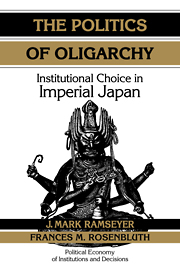Book contents
- Frontmatter
- Contents
- List of tables and figure
- Series editors' preface
- Acknowledgments
- CHAPTER 1 INTRODUCTION
- CHAPTER 2 THE COLLAPSE OF OLIGARCHY: FAILED ATTEMPTS AT CARTEL-MAINTENANCE
- CHAPTER 3 CONCESSION OR FACADE: THE MEIJI CONSTITUTION
- CHAPTER 4 ELECTORAL RULES AND PARTY COMPETITION: THE STRUGGLE FOR POLITICAL SURVIVAL
- CHAPTER 5 THE BUREAUCRACY: WHO RULED WHOM?
- CHAPTER 6 THE COURTS: WHO MONITORED WHOM?
- CHAPTER 7 THE MILITARY: MASTER OF ITS OWN FATE
- CHAPTER 8 FINANCIAL POLITICS
- CHAPTER 9 RAILROAD POLITICS
- CHAPTER 10 COTTON POLITICS
- CHAPTER 11 CONCLUSION: INSTITUTIONS AND POLITICAL CONTROL
- Notes
- References
- Index
CHAPTER 3 - CONCESSION OR FACADE: THE MEIJI CONSTITUTION
Published online by Cambridge University Press: 05 June 2012
- Frontmatter
- Contents
- List of tables and figure
- Series editors' preface
- Acknowledgments
- CHAPTER 1 INTRODUCTION
- CHAPTER 2 THE COLLAPSE OF OLIGARCHY: FAILED ATTEMPTS AT CARTEL-MAINTENANCE
- CHAPTER 3 CONCESSION OR FACADE: THE MEIJI CONSTITUTION
- CHAPTER 4 ELECTORAL RULES AND PARTY COMPETITION: THE STRUGGLE FOR POLITICAL SURVIVAL
- CHAPTER 5 THE BUREAUCRACY: WHO RULED WHOM?
- CHAPTER 6 THE COURTS: WHO MONITORED WHOM?
- CHAPTER 7 THE MILITARY: MASTER OF ITS OWN FATE
- CHAPTER 8 FINANCIAL POLITICS
- CHAPTER 9 RAILROAD POLITICS
- CHAPTER 10 COTTON POLITICS
- CHAPTER 11 CONCLUSION: INSTITUTIONS AND POLITICAL CONTROL
- Notes
- References
- Index
Summary
INTRODUCTION
Consider why the oligarchs established a representative assembly. In many ways, the choice they faced resembled decisions made by any autocratic government in any era. But crucial to their choice, we argue, were their numbers. Modern cartel theory suggests that an oligarchy should act fundamentally differently from a dictatorship.
We consider four reasons for the oligarchs' acquiescense to a legislature. First, perhaps the oligarchs hoped to maximize their personal income, and decided that constructing an efficient economy would be the best way to do so. Establishing a legislative check on their power would send a credible signal to investors that they would not use their power to confiscate private property. In the process they would encourage economic growth, and growth in turn would generate more cream for them to skim off.
Second, perhaps the oligarchs were so insulated in the upper stratum of Japanese society that they lacked information about the source of discontent in other social tiers. Recognizing the danger of this predicament, they may have decided to hold regular elections. Through the elections, citizens would choose from among candidates who offered a variety of reformist policy portfolios. In the process the oligarchs would learn what concessions would most effectively and cheaply forestall revolution.
Third, perhaps the oligarchs thought it necessary to share power with entrepreneurs from the political parties before those entrepreneurs launched a full-scale revolution. If so, they may have been acting more urgently and more defensively than either the wealth-maximization or information-maximization hypotheses would suggest.
- Type
- Chapter
- Information
- The Politics of OligarchyInstitutional Choice in Imperial Japan, pp. 29 - 40Publisher: Cambridge University PressPrint publication year: 1995



